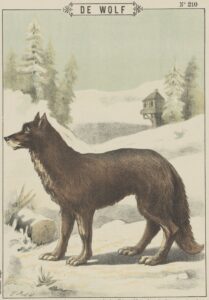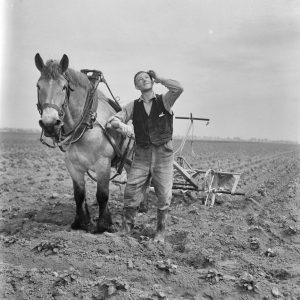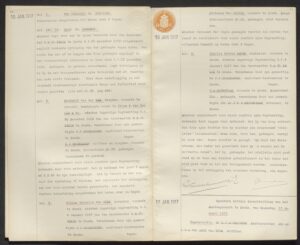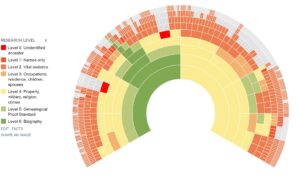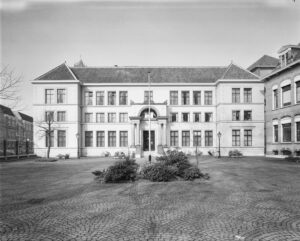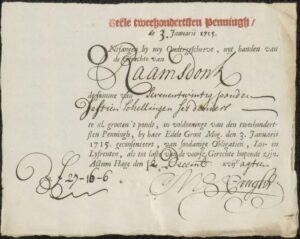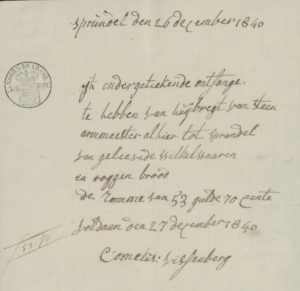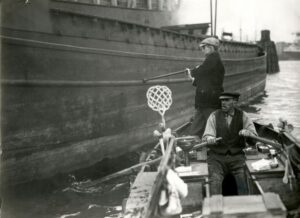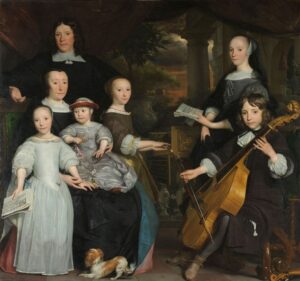A wolvenjager was a wolf hunter. Some towns offered a bounty for killed wolves, or employed a wolvenjager to kill wolves that were attacking lifestock. This was so successful that wolves were extinct in the Netherlands for more than a century. In recent years, they have found their way back to the Netherlands and several packs are now living in the country again. … [Read more...]
Quick tip – Read between the lines
I am having fun with an 1827 inventory of the assets belonging to an ancestor. I love reading between the lines to see what the items tell us about my ancestor. Here are some things I noticed. He owned multiple plots of land, had different crops in the field, and had several types of grain stored. Agriculture was likely his main source of income. He owned three cows, one calf, no bulls. Three cows is not enough to live off, so they were probably for their personal use and for the manure … [Read more...]
Dutch term – Audiëntieblad
An audiëntieblad (literally: audience sheet or audience paper) are the transcripts of court sessions, created by court clerks. Audiëntiebladen record the cases that were heard on a day, including continuances. Some include the verdicts, but sometimes the verdicts are kept in a different series. You can find audiëntiebladen in the series of court records of the local and district courts. Court records older than 75 years are typically kept at the regional historical centers in the provincial … [Read more...]
Level up challenge – 2023 progress report
Two years ago, I issued my level-up challenge. I wanted to take my research to a higher level by gathering more complete information and documentation about my ancestors. See the original blog post for an overview of the levels. In this blog post, I will reflect on my progress in the past year. My goal for 2022 was to get my generation 1-6 ancestors to level 3 or higher. Progress Here's my starting point in 2021: Situation in 2022: Situation now in 2023: Some of these … [Read more...]
Quick tip – No courthouse research in the Netherlands
In the Netherlands, we do not do any of our research in courthouses. If you are an American genealogist, you may be used to visiting the courthouse to get court records. In the Netherlands, such records are transferred to government archives after twenty years. They are typically public after seventy-five years. They are increasingly available online, either as scanned images or via scanning-on-demand. Otherwise, the records can be consulted at the archives in person. Access to court … [Read more...]
Dutch Genealogy News for December 2022
Here is an overview of the new sources, websites, and projects that were announced last month. Sources Scans and indexes of population registers of Bolsward, Hemelumer Oldeferd en Noordwolde, IJlst, Sneek, Stavoren, Wymbritseradeel, Wonseradeel, and Workum in Friesland 1850-1922 have been added to AlleFriezen. This adds over 750,000 names to the database. More than 350 volunteers helped to index the records. See the article about population registers to read more about this source. … [Read more...]
Records that became public in 2023
Happy New Year everybody! Many records become public after 20, 25, 50, 75, or 100 years. Here is an overview of some of the records that became public as of 1 January 2023. Exceptions may exist for records that involve people that could still be alive. Just because records are public does not mean they are immediately available online. Some archives digitize the birth, marriage, and death records immediately, others do not. Some records will be online, some may be ordered via scanning on … [Read more...]
Poor relief records – Not just for poor folks
Several of my ancestors were poor. Some were so poor that they relied on charity. I have found several of them in the records of charitable organizations, such as the deacons of protestant churches, Holy Ghost tables of catholic churches, and civil poor administrations. When I went through the records, I also found ancestors who were not poor; in other capacities. These sources include many names besides the people needing poor relief: Officials, such as the deacons, Holy Ghost Masters, … [Read more...]
Dutch term – Parlevinker
A parlevinker is a trader who sells his wares, usually groceries, by boat. They can often be found in harbors. … [Read more...]
Quick tip – Who had the money?
When studying your ancestors, it is helpful to know who the rich people in the community were, even if your ancestors were poor. The rich people in the community may have interacted with your ancestors, and may have created records about them: Rich people may have employed them, for example as laborers, servants, or factory workers. They may have bought their products, for example in the case of shoemakers or weavers. They may have used their services, for example in the case of … [Read more...]
